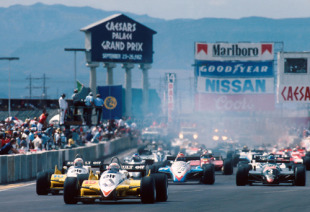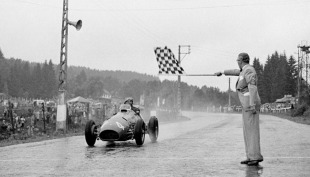
- Drivers:
- Michele Alboreto
- |
- Chris Amon
- |
- René Arnoux
- |
- Alberto Ascari
- |
- Elio de Angelis
- |
- Andrea de Cesaris
- |
- Niki Lauda
- |
- Riccardo Patrese
- |
- Nelson Piquet
- |
- Didier Pironi
- |
- Alain Prost
- |
- Keke Rosberg
- |
- Michael Schumacher
- |
- Ayrton Senna
- |
- Patrick Tambay
- |
- John Watson
Which season has seen the most different drivers winning a Grand Prix? asked Carl Howe
The most open of F1 seasons was 1982, when no fewer than 11 different drivers stood on top of the podium. Alain Prost, in a Renault, won the first two races, before Niki Lauda (McLaren) won at Long Beach, Didier Pironi (Ferrari) at Imola, John Watson (McLaren) in Belgium, and Riccardo Patrese (Brabham) in Monaco. Watson won again in Detroit before Nelson Piquet (Brabham) triumphed in Canada. Repeat wins for Lauda and Pironi in Holland and Britain were followed by victory for Rene Arnoux (Renault) in France, Patrick Tambay (Ferrari) in Germany, Elio de Angelis (Lotus) in Austria and Keke Rosberg (Williams) at the Swiss GP at Dijon. Arnoux won at Monza, then the season was rounded off with victory for Michele Alboreto (Tyrrell) in the Caesar's Palace GP in Las Vegas. Rosberg's solitary victory, allied to consistent points-scoring through the year, was enough to earn him the world championship.
Who has won the most races in one make of car - is it Michael Schumacher? asked Tim Fordyce
Not surprisingly, you've got it right: of Michael Schumacher's 91 GP wins, 72 came at the wheel of a Ferrari (the other 19 were for Benetton). Since no-one else has won more than Alain Prost's 51 GPs all told, Schumacher is well out in front on this score. Next, with 35 wins for McLaren, is Ayrton Senna; Prost won 30 in a McLaren, and Nigel Mansell 28 in a Williams, while all Jim Clark's 25 Grand Prix victories came at the wheel of a Lotus.
With four cars called Lotus on the grid now, the name might soon record another GP win. When was the last time a Lotus won a Grand Prix? asked Dennis Anderson
The last time a Lotus driver topped the podium was in 1987, when Ayrton Senna won successive races in Monaco and Detroit. He led the drivers' championship at that point (after five races) but slipped to third behind Nigel Mansell and the eventual champion Nelson Piquet. The win in Detroit was Lotus's 79th success in a world championship Grand Prix.
I caught a bit of a race from the exciting Australian V8 Supercar series last week, and spotted a driver called Coulthard. Is David making a comeback? asked Paul Mitchell
Funnily enough I had the same thought while watching one of those Aussie V8 races recently. But it's not David Coulthard adding to what must already be an impressive collection of air miles by commuting Down Under for races: the man in question is Fabian Coulthard, who was born in Lancashire but is now resident in New Zealand, and drives a Holden Commodore for Walkinshaw Racing. A few years ago, though, while still racing in Britain, Fabian was Lewis Hamilton's team-mate in Formula Renault. The two Coulthards are not, as far as I know, related.

The record is usually given as nine successive races, by Alberto Ascari in 1952 and 1953. Driving a Ferrari, Ascari won the last six races of 1952 (there were only seven GPs that season, and he missed the first one), then won the first three races of 1953, his run starting and ending with victory in the Belgian GP. However, that nine-race run was punctuated by the Indianapolis 500, which counted towards the championship at the time - but very few European drivers and teams entered it, and Ascari did not take part that year. If you count that, his run ended at seven successive wins. That still equals the modern-day record, set by Michael Schumacher in 2004 when he peeled off seven successive victories in mid-season - he won 12 of the first 13 GPs that year, rather reducing the world championship excitement factor.
Andrea de Cesaris drove ten different types of car in F1. Is this a record? asked Nilu Humne via Facebook
Andrea de Cesaris took part in a record 208 GPs without winning one, and that included drives for Alfa-Romeo, Ligier, Minardi, Brabham, Rial, Dallara, Jordan, Tyrrell and Sauber. The man who acquired the rather unfortunate nickname of "de Crasheris" early in his career was second in the German and South African GPs of 1983, when driving for Alfa. My first thought was that de Cesaris's ten teams would indeed be a record - but it wasn't. Stefan Johansson, Stirling Moss and Maurice Trintignant also raced ten different makes of car in F1, but the clear leader, with 13, is the New Zealander Chris Amon. In a career that stretched from 1963 to 1976 Amon - widely considered to be the best driver never to win a Grand Prix - drove 13 different makes of car: Lola, Lotus, Brabham, Cooper, Ferrari, March, Matra, Tecno, Tyrrell, Amon, BRM, Ensign and Williams. Amon had three second places - the 1968 British GP in a Ferrari, and in Belgium and France in 1970, in a March.
And there's an addition to the question in the last column about Schumacher 1-2s, from Tim Clarke
"There were two further Schumacher 1-2s to the ones you mentioned - in the French GP of 2001 and the Brazilian in 2002, Michael coming out on top both times. It almost happened in the 2004 Canadian GP as well, but Ralf was disqualified after finishing second behind Michael, as his Williams had some sort of brake irregularities."
If you want to ask Steven a question, use our feedback form. The most interesting questions will be answered here every other Friday. His long-running Ask Steven column on Cricinfo remains one of that site's most popular features
© ESPN Sports Media Ltd.
 If you want to ask Steven a question, use our feedback form. The most interesting questions will be answered here every other Friday. His long-running Ask Steven column on Cricinfo remains one of that site's most popular features Ask Steven features a number of experts, headed by Steven Lynch, who answer your questions across Formula One as well as a variety of other sports
If you want to ask Steven a question, use our feedback form. The most interesting questions will be answered here every other Friday. His long-running Ask Steven column on Cricinfo remains one of that site's most popular features Ask Steven features a number of experts, headed by Steven Lynch, who answer your questions across Formula One as well as a variety of other sports

